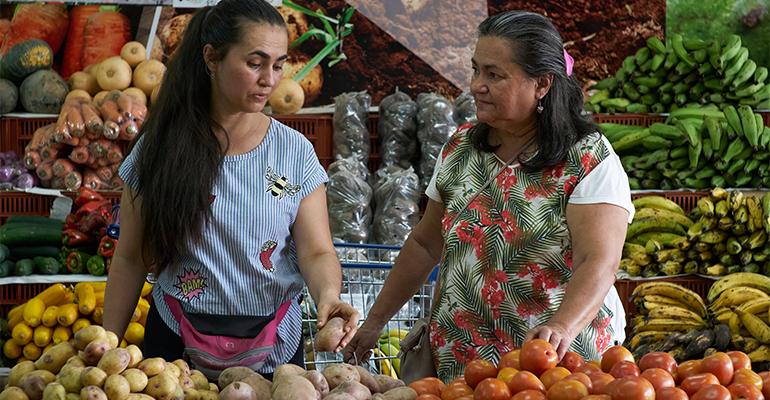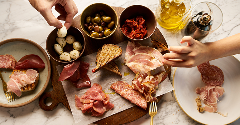News
Value with values: Sustainable products must be affordable for Latin Americans
8 Jul 2022
As inflation begins to bite, budget-conscious consumers in Latin America are looking for food and drink products that offer value for money – but sustainability concerns are still there so brands need to show how good-for-the-planet and budget can go together, says Mintel.
The global food supply chain has been rocked in recent years, first by the Covid-19 pandemic and more recently by Russia’s invasion of Ukraine which has halted wheat and sunflower seed exports from Ukraine – one of the world’s major exporting countries for these commodities. Subsequent export bans by major commodity-producing countries such as Indonesia, which announced a ban on palm oil exports (lifted in May due to improved domestic supplies), and India for wheat, following a severe drought that affected its harvest.

In May, international wheat prices rose for a fourth consecutive month, up 5.6% - only 11% below the record high reached in March 2008, according to the May FAO Food Price Index by the Food and Agriculture Organization (FAO).
IMF: Soaring cost of food will add to economic strains
While Latin American economies are no stranger to price volatility and social inequalities, the current financial and supply chain crises are putting even more consumers at risk of hardship, according to International Monetary Fund (IMF) analysts.
“For a region with historically high levels of inequality, the erosion of real incomes due to the soaring cost of food and energy will only add to the economic strains faced by vulnerable households in the region,” they wrote in April this year, when inflation in Latin America’s largest economies hit the highest levels in 15 years. “And [...] low-income households were already the most affected by the economic consequences of the pandemic.”
Recent research by Mintel shows that 30% of consumers in Brazil say that their financial situation is “tight”, followed by 28% in Chile, 24% in Argentina and 21% in Mexico while 15% of Colombians say they are “struggling”.
Responsible brands that deliver value-for-money will resonate
This has implications for food and drink brands in the region, says Graciana Méndez, senior regional insights analyst for Latin America at Mintel.
“Price sensitivity will remain a longer-term effect in Latin America. Companies will need to be more detailed about the ingredients, processes and corporate social responsibility (CSR) commitments that contribute to a product's price,” she wrote in a Mintel analysis entitled ‘COVID-19 two years later: value in LATAM’.
“Brands that deliver value for money and operate responsibly will resonate more with consumers in 2022. Recessions focus people on their own needs, but COVID-19 has sensitized people to the needs of others less fortunate than themselves.”
Be transparent about the reasons for price rises
Large numbers of consumers surveyed by Mintel – 44% of Brazilians and 42% of Peruvians, for example – said they would remain loyal to brands that were transparent when it came to explaining price rises.
Nevertheless, switching from usual brands to find cheaper products was the preferred strategy for around one-quarter – ranging between 23 and 27% – of respondents from all six countries included in the survey (Brazil, Mexico, Chile, Argentina, Colombia, and Peru).
Premium positioned brands could therefore see their sales drop as consumers cut back on treats. Forty-two percent of Brazilians and Peruvians said they would spend less on premium treats like gourmet coffees and sweets while 45% of Mexicans said they would spend less on eating out at restaurants or cafes
Mintel’s advice: Position plant-based meat as affordable alternatives
Meat is prominent in Latin American cuisine and meat alternatives could become more attractive as the cost of meat surges. Positioning plant-based meat products as a nutritious and cost-efficient alternative or blending meat and animal proteins could be winning strategies in this respect, says Méndez.
Ecuadorian brand Mr Cook launched chicken nuggets with added quinoa and chia as a plant-based source of protein, for instance, while Argentinian retailer Dia launched a plant-based milanesa, a breaded meat cutlet hugely popular in Argentina, made with soy and spinach.
“After two unprecedented years, inflation, rising living costs and surging food prices are driving consumers to seek value in different shapes and forms,” concludes Méndez. “More explicit communication about what a product price entails has become an expectation. Brands that embrace price transparency while delivering value for money and operating responsibly will be top of mind.”
Related news

Bone broth: From old-fashioned to en vogue
24 Nov 2025
OXO’s entry into bone broth has turned the spotlight on this small but high-performance category – and there is still scope for growth, especially in the area of GLP-1 support.
Read more
UK Government overhauls childhood obesity strategy
21 Nov 2025
The UK Government has announced a new package of measures designed to reverse the nation’s childhood obesity epidemic following the release of statistics revealing the scale of the crisis.
Read more
Nitrites: Pressure grows on UK to follow EU’s lead
20 Nov 2025
Pressure is growing on the UK to follow the EU’s lead after the bloc revised its regulations on the permitted levels of nitrites and nitrates in cured meats.
Read more
Matcha madness: Why green is this year’s hottest colour
19 Nov 2025
Five years ago, it was a struggle to find matcha outside of Japan. Now it seems to be popping up everywhere, from coffee shops to supermarket shelves.
Read more
How younger consumers are redefining ingredient choices and rejecting brand loyalty
18 Nov 2025
Gen Z and millennial consumers’ preferences for transparency, functionality, and purpose are “redefining the very nature of consumption itself”, says SPINS.
Read more
Hybrid formats and flexible positioning to disrupt category norms in 2026
17 Nov 2025
Trend forecasters expect food and drink to move more fluidly across occasions, functions, and formats as consumers seek versatility, novelty, and convenience.
Read more
Danone highlights digestive health as potential ‘tipping point’ for food industry
13 Nov 2025
Danone is betting on a food industry “tipping point” that will bloat the market for healthy products, particularly those related to gut health.
Read more
Soy story: WWF scores UK supermarkets on sustainability efforts
12 Nov 2025
WWF has published its latest “Soy Scorecard”, ranking UK supermarkets’ efforts to combat deforestation and land conversion in their soy supply chains.
Read more
New UPF standard hoped to offer consumers ‘coherence and clarity’
10 Nov 2025
Ingredients companies are being urged to enter “a new era of partnership and innovation” following the launch of the industry’s first non-UPF verification scheme.
Read more
Cottage cheese makes a comeback as consumers call for cleaner labels
6 Nov 2025
From ice cream to dips and ready meals, cottage cheese is experiencing a renaissance as a high-protein, clean ingredient for health-conscious consumers.
Read more